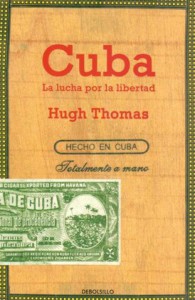Among the books on Cuba which I consider absolutely essential is the monograph entitled Cuba: The Pursuit of Freedom written by Hugh Thomas, English historian specializing in Hispanic history. It was written during the author’s stay in Havana between 1964 and 1971.
In the preface, Thomas explains that the idea of writing about Cuba occurred to him when he was standing on the Plaza de la Revolución square, listening to one of Fidel Castro’s gloomy speeches, “and the crowd in the square behaved as if they were on a picnic in the open air, singing and dancing to the rhythm of cha-cha-cha”.

In front of this picturesque panorama (no doubt very strange for him), his intention to write something brief gave way to a more ambitious project and Thomas soon started his historical research. His efforts resulted in a 1276-page book, which begins with the British take-over of Havana in 1762 and ends with the ten-million tonne sugarcane harvest of 1971. Thomas’s wonderful book proves the author’s genius for historical research.
It should be noted, however, that not everything was as easy as winking for Thomas: he did face difficulties. As a historian doing research in Cuba, he stumbled upon information gaps which were due to the regime’s secrecy about the true history of the country. Most importantly, he was denied access to the Cuban-Soviet archives kept by the government, which he commented by saying that it was “unrealistic to expect that history has an answer for everything”. Thomas could never inspect the secret documents, predicting that in fifty years, historians would “still be in the same situation.” Instead, he relied heavily on long conversations with eyewitnesses, which formed his main source of information on certain historical events.
Thomas did not omit any important event of those hard-to-map years, no matter how difficult the investigation was. I dare say that this is precisely the reason why his book has never been published or edited in Cuba. Fidel Castro or his censorship authorities never approved it.
Indeed, Thomas’s great work comprises everything: it explains the reasons of the failure of the general strikes of 1957 and 1958, narrates the story of the armoured train of Santa Clara, analyses the decline of the liberals and the missile crisis, etc.
Sadly, the famous Briton has never been able to come back to Cuba to continue with his research of what there remains to be told. That’s what happens to those who want to learn the truth from the first hand – from the most reliable sources, under the dictatorship of the Castro brothers. I suspect that the same fate was suffered by Brian Latell (retired CIA analyst), author of the book After Fidel: The Inside Story of Castro’s Regime.
The books of these two authors reveal the history woven behind the scenes, the Machiavellian plot constructed by Fidel Castro for the sake of his political convenience, with all its twists and turns. In the absence of other historical works, the two monographs may have been the very reason of the formation of an army of independent journalists hungry for the truth back in late 1987, which emerged from the Human Rights Movement.
With the help of the authors like Hugh Thomas, Brian Latell, Jaime Suchlicki, Carlos Alberto Montaner, Hubert Matos and Ernesto Díaz Rodríguez, we, the independent journalists, have managed to avoid the trap of becoming continuators or local biographers in the service of the Castro regime; instead, we use our common sense and our sixth sense to investigate the current events. Also, we have been digging out old stories (perhaps hidden, perhaps falsified) and denouncing the loss of civil liberties, violations that continue to occur as well as the obsolete communist demagogy of the dictatorship which, hopefully, is in its death throes.

Leave a comment